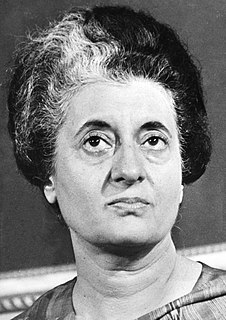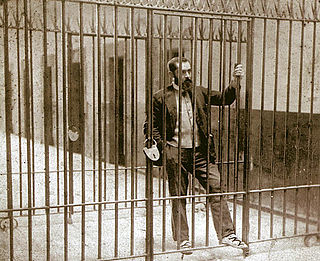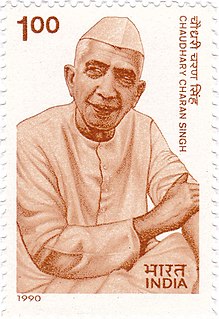
Chaudhary Charan Singh served as the 5th Prime Minister of India between 28 July 1979 and 14 January 1980. Historians and people alike frequently refer to him as the 'champion of India's peasants.'
The Janata Party was an amalgam of Indian political parties opposed to the Emergency that was imposed between 1975 and 1977 by Prime Minister Indira Gandhi of the Indian National Congress. In the 1977 general election, the party defeated the Congress and Janata leader Morarji Desai became the first non-Congress prime minister in independent modern India's history.
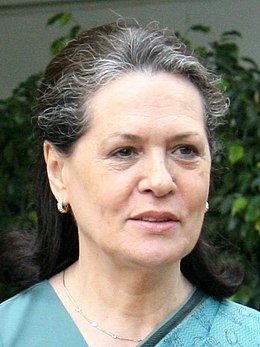
Legislative elections were held in India in four phases between 20 April and 10 May 2004. Over 670 million people were eligible to vote, electing 543 members of the 14th Lok Sabha. The Lok Sabha, or "House of the People," is the directly elected lower house of the Parliament of India.
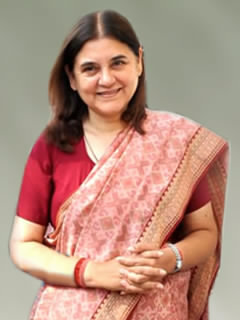
Maneka Sanjay Gandhi is the Indian Union Cabinet Minister for Women & Child Development in the Government of PM Narendra Modi. She is also an animal rights activist, environmentalist, and widow of the Indian politician Sanjay Gandhi. She has been a minister in four governments, and has authored a number of books in the areas of etymology, law and animal welfare. Maneka Gandhi is a member of the Nehru-Gandhi Family.
The Indian National Lok Dal (INLD) is a political party in India, in the state of Haryana. INLD was founded in October 1996 as Haryana Lok Dal (Rashtriya) by Choudhary Devi Lal, who served as Deputy Prime Minister of India in the V.P. Singh's Cabinet and Chief Minister of Haryana twice. His son Om Prakash Chautala is the president.
The Indian National Congress (Organisation) or Congress (O) was a political party in India formed when the Congress party split following the expulsion of Indira Gandhi.

Raj Narain was an Indian freedom fighter and politician. He won in a famous electoral malpractice case against the then Prime Minister Indira Gandhi, which led to her disqualification and imposition of Emergency in India in 1975. He defeated Indira Gandhi during the 1977 Lok Sabha elections.

India held general elections to the 5th Lok Sabha in March 1971. This was the fifth election since independence in 1947. The 27 Indian states and union territories were represented by 518 constituencies, each with a single seat. Under the leadership of Indira Gandhi, the Indian National Congress (R) led a campaign which focussed on reducing poverty and won a landslide victory, overcoming a split in the party and regaining many of the seats lost in the previous election.

India held general elections to the 7th Lok Sabha in January 1980. The Janata Party alliance came into power after the elections to the 6th Lok Sabha held in 1977, riding the public anger against the Congress and the Emergency but its position was weak. The loose coalition barely held on to a majority with only 295 seats in the Lok Sabha and never quite had a firm grip on power.

Hemwati Nandan Bahuguna was a Congress Party leader and former Chief Minister of Uttar Pradesh; he later joined Bharatiya Lok Dal and worked with Charan Singh.
Bahraich Lok Sabha constituency is one of the 80 Lok Sabha (parliamentary) constituencies in Uttar Pradesh state in northern India. Bahraich is reserved for the SC category.
Major Nawab Sayyid Zulfikar Ali Khan Bahadur was an Indian politician and army officer who ruled as Titular Nawab of Rampur from 1982 to 1992, succeeding his elder brother Murtaza Ali Khan Bahadur.
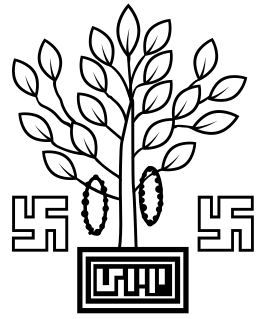
The Politics of Bihar, a state in eastern India, was characterised, in the early 2000s, by weak governance and corrupt politicians. Currently, there are four main political Parties: Rashtriya Janata Dal, Janata Dal (United), Bharatiya Janata Party and Lok Janshakti Party. All four along with some smaller regional parties like Rashtriya Lok Samata Party and Hindustani Awam Morcha are playing vital role in bihar politics. while Indian National Congress is a small player in Bihar Politics. Bihar is currently ruled by Janta Dal (United) and Bhartiya Janta Party coalition.
The Congress for Democracy (CFD) was an Indian political party founded in 1977 by Jagjivan Ram. It was formed after Jagjivan Ram, Hemvati Nandan Bahuguna, and Nandini Satpathy left the Indian National Congress of Indira Gandhi and denounced her rule during the Indian Emergency. The party contested the Indian general election, 1977 with the Janata alliance and later merged with it.
The Janata Morcha was a coalition of Indian political parties formed in 1974 to oppose the government of Indian Prime Minister Indira Gandhi and her Congress (R) party. The coalition was an integral part of the popular movement against the Emergency rule of Indira Gandhi and the direct predecessor of the Janata Party, which defeated the Congress (R) in the Indian general election, 1977 to form the first non-Congress government in independent India. It was formed by Jayaprakash Narayan and Morarji Desai, chief of the main opposition Congress (O) party.
The State of Uttar Pradesh v. Raj Narain was a 1975 case heard by the Allahabad High Court that found the Prime Minister of India Indira Gandhi guilty of electoral malpractices. Ruling on the case that had been filed by the defeated opposition candidate, Raj Narain, Justice Jagmohanlal Sinha invalidated Gandhi's win and barred her from holding elected office for six years. The decision caused a political crisis in India that led to the imposition of a state of emergency by Gandhi's government from 1975 to 1977.

Chandra Shekhar was an Indian politician who, served as the eleventh Prime Minister of India, between 10 November 1990 and 21 June 1991. He headed a minority government of a breakaway faction of the Janata Dal with outside support from the Indian National Congress as a stop gap arrangement to delay elections.Chandrasekhar is the first Indian Prime Minister who has never held any Government office. His government was largely seen as a "puppet" and "lame duck" and the government was formed with the fewest party MPs in the Lok Sabha of the Congress. His government could not pass the budget at a crucial time when Moody had downgraded India and it further went down after the budget was not passed and global credit-rating agencies further downgraded India from investment grade making it impossible to even get short term loans and in no position to give any commitment to reform the World Bank and IMF stopped their assistance. Chandrasekhar had to authorise mortgaging of gold to avoid default of payment and this action came in for particular criticism as it was done secretly in the midst of the election. The Indian economic crisis, 1991, and the Assassination of Rajiv Gandhi plunged his government into crisis.
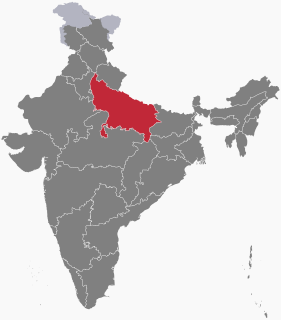
Elections in Uttar Pradesh are conducted every five years to elect the State assembly and its share of members to the Lok Sabha. The elections are conducted in accordance with the Constitution of India. The Assembly of Uttar Pradesh creates laws regarding the conduct of local body elections unilaterally while any changes by the state legislature to the conduct of state level elections need to be approved by the Parliament of India. In addition, the state legislature may be dismissed by the Parliament according to Article 356 of the Indian Constitution and President's rule may be imposed. There are 403 assembly constituencies and 80 Lok Sabha constituencies(seats). The 80 Lok Sabha constituencies of Uttar Pradesh are a deciding factor for who holds power in the 16th Lok Sabha. The state has conducted 17 assembly elections and 16 Lok Sabha elections since independence.


